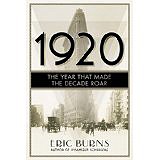Flappers, the Red Scare, illegal booze, the Lost Generation, political scandals, the original Ponzi scheme - the Roaring Twenties holds appeal for history buffs and even those with little interest in history. "1920: The Year That Made the Decade Roar," written by former NBC newsman Eric Burns, offers a look at an eventful year that introduced a remarkable decade. It's a big story about a time when the U.S. was undergoing major cultural and social changes and dealing with world power - issues that still dominate our news today.
The U.S. began prospering after the end of World War I, although prosperity was selective. Millions of immigrants entered the country, hoping for better lives; most ended up as menial laborers with few rights in factories and mines owned by uber-rich industrialists. Burns notes the "great paradox" upon which the country was built - that the men who created the nation's wealth willingly "destroyed the lives of their workforce in the process." In 1920 alone, there were 3,600 labor strikes in the U.S. This era saw a resurgence of the Ku Klux Klan, divisions among those who wanted borders open or closed, and raids on suspected terrorists. An actual terrorist strike occurred on Wall Street in 1920, the worst homegrown attack until the Oklahoma City bombing in 1995.
Two constitutional amendments passed in 1920: the 18th, which prohibited alcohol, and the 19th, which granted voting rights to women. The 18th, openly flouted and leading to all kinds of criminal activities, was repealed by the 21st, "the only constitutional amendment ever acknowledged to be an error and tossed into a Capitol Hill wastebasket."
During the 1920s, African-Americans moved in large numbers from the South to the North and West to seek jobs and a less-oppressive existence. The Harlem Renaissance emerged, bringing the literary works of such luminaries as Langston Hughes and Zora Neale Hurston to a wide audience. The great musical experiment of jazz, born in New Orleans, traveled to Chicago, Harlem and other towns where black musicians performed.
In 1920, only a third of American homes had electricity, a number that would double by 1930. Workplace electrification enabled the development of new businesses and increased production. Adding to this growth was major demographic change, as the population transitioned from rural to urban, according to the 1920 census.
American mass media gained force in 1920, with the growing popularity of radio, perhaps one of the era's most important trends. News of Warren G. Harding's election as president was broadcast on the radio for the first time.
Planned Parenthood had its beginning in 1920, resulting from Margaret Sanger's work to inform women about effective birth control, another issue still controversial today.
Burns has jam-packed this book with so much information that it almost seems to call for a second volume. He tells a compelling story and does an excellent job detailing the links between 1920s events and 21st-century America.
Madeline Matson is reference and adult programming librarian for Missouri River Regional Library.

